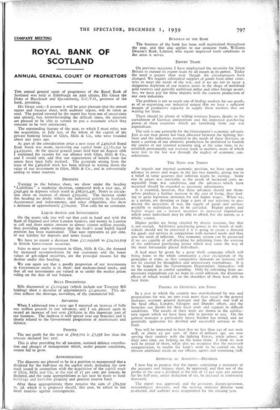THE NEED FOR THRIFT
As regards our internal economic position, we have seen some advance in prices and wages in the last two months, giving rise to a belief in some quarters that inflation might be starting. Some rise in prices was inevitable as the result of increased costs in- separable from war conditions, and the advances which have occurred should be regarded as necessary adjustments.
It is essential, however, that these advances should not them- selves produce a further increase in the cost of living, thus lead- ing to quite legitimate demands for still higher wages. When we, as a nation, are devoting so large a part of our activities to pro- ducing the necessities of war, the supply of goods and services available to individuals has to be curtailed. Higher profits and higher wages are a natural incentive to increased expenditure which some individuals may be able to afford, but the nation, as a whole, cannot.
Higher profits are being checked by drastic taxation, but that is not enough. Additional purchasing power in the hands of indi- viduals should not be exercised if it is going to create a demand for goods and services in competition with national needs and thus sow the seeds of inflation. Our economic system can be preserved if we are capable of self-discipline by refraining from the exercise of the additional purchasing power which may come the way of the more fortunately placed individuals.
A lead must be given by a great thrift campaign which will bring home to the whole community a clear recognition of the principles at stake, so that competitive demands on industry will not be created by thoughtless and unnecessary expenditure. It is to be hoped that the Government Departments themselves will set the example in careful spending. Only by refraining from un- necessary expenditure can we hope to avoid inflation, the disastrous effects of which would fall on the shoulders of those least able to bear them.












































 Previous page
Previous page